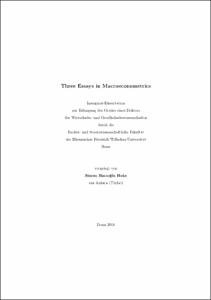Hacioğlu Hoke, Sinem: Three Essays in Macroeconometrics. - Bonn, 2016. - Dissertation, Rheinische Friedrich-Wilhelms-Universität Bonn.
Online-Ausgabe in bonndoc: https://nbn-resolving.org/urn:nbn:de:hbz:5-45044
Online-Ausgabe in bonndoc: https://nbn-resolving.org/urn:nbn:de:hbz:5-45044
@phdthesis{handle:20.500.11811/6826,
urn: https://nbn-resolving.org/urn:nbn:de:hbz:5-45044,
author = {{Sinem Hacioğlu Hoke}},
title = {Three Essays in Macroeconometrics},
school = {Rheinische Friedrich-Wilhelms-Universität Bonn},
year = 2016,
month = oct,
note = {Motivated by the recent availability of extensive macroeconomic data sets, this thesis consists of three independent chapters that examine the ways to approach to this issue from various angles.
The first chapter discusses the particularities of forecasting with factor-augmented predictive regressions under general loss functions. In line with the literature, principal component analysis is employed to extract factors from the set of predictors. We also extract information on the volatility of the series to be predicted, since volatility is forecast-relevant under non-quadratic loss functions. Both the theoretical and the empirical results emphasize the importance of using the relevant loss functions while performing forecasting exercises with extracted factors.
The second chapter proposes a Threshold Factor Augmented Vector Autoregression model to address the interpretability issue of factors. The novelty is the interpretation of factors by observing how frequently factor loadings fall below estimated thresholds and become irrelevant. The results indicate that we are able to relate most of the factors to specific categories of the data without any prior specification on the data set.
The third chapter uses the large information sets in vector autoregression sense. Motivated by the desire to probe macroeconomic tail events and to capture nonlinear economic dynamics, we estimate two types of regime switching models with Bayesian estimation methods: Threshold VAR and Markov switching VAR. We also use linear Bayesian VAR model as a benchmark. We show that small shock hitting in recessions worsen financial stress. Similarly small shocks hitting in financially stressful periods worsen recessions. We also demonstrate the power of a feedback loop between real and financial sectors when extremely large shocks hit the economy in normal/financially stable periods.},
url = {https://hdl.handle.net/20.500.11811/6826}
}
urn: https://nbn-resolving.org/urn:nbn:de:hbz:5-45044,
author = {{Sinem Hacioğlu Hoke}},
title = {Three Essays in Macroeconometrics},
school = {Rheinische Friedrich-Wilhelms-Universität Bonn},
year = 2016,
month = oct,
note = {Motivated by the recent availability of extensive macroeconomic data sets, this thesis consists of three independent chapters that examine the ways to approach to this issue from various angles.
The first chapter discusses the particularities of forecasting with factor-augmented predictive regressions under general loss functions. In line with the literature, principal component analysis is employed to extract factors from the set of predictors. We also extract information on the volatility of the series to be predicted, since volatility is forecast-relevant under non-quadratic loss functions. Both the theoretical and the empirical results emphasize the importance of using the relevant loss functions while performing forecasting exercises with extracted factors.
The second chapter proposes a Threshold Factor Augmented Vector Autoregression model to address the interpretability issue of factors. The novelty is the interpretation of factors by observing how frequently factor loadings fall below estimated thresholds and become irrelevant. The results indicate that we are able to relate most of the factors to specific categories of the data without any prior specification on the data set.
The third chapter uses the large information sets in vector autoregression sense. Motivated by the desire to probe macroeconomic tail events and to capture nonlinear economic dynamics, we estimate two types of regime switching models with Bayesian estimation methods: Threshold VAR and Markov switching VAR. We also use linear Bayesian VAR model as a benchmark. We show that small shock hitting in recessions worsen financial stress. Similarly small shocks hitting in financially stressful periods worsen recessions. We also demonstrate the power of a feedback loop between real and financial sectors when extremely large shocks hit the economy in normal/financially stable periods.},
url = {https://hdl.handle.net/20.500.11811/6826}
}






